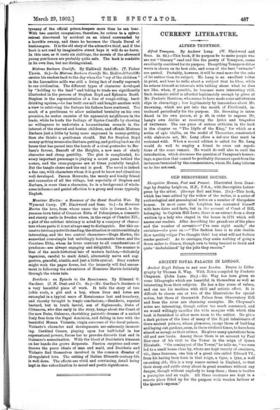Mistress Barbara Cunliffe. By Halliwell Sutcliffe. (T. Fisher Un w
in. 6s.)—In Mistress Barbara Cunliffe Mr. Halliwell Sutcliffe carries his readers back to the day when the " cry of the children " in the Lancashire mills was still a living fact of deadly reproach to our civilisation. The different types of character developed by "holding to the land" and taking to trade are significantly illustrated in the persons of Stephen Royd and Ephraim Booth Stephen is the representative of a line of rough-riding, hard- drinking squires,—he has built one mill and bought another with a view to retrieving the fortune his fathers have scattered. Too much of a gentleman to allow unlimited brutality on his own premises, he makes enemies of his squeamish neighbours in the trade, while he hurts the feelings of Squire Cunliffe by showing no willingness to undertake a humanitarian crusade in the interest of the starved and beaten children, and offends Mistress Barbara just a little by being more engrossed in money-getting than she thinks a gentleman should. But for Stephen Royd money-getting means also Barbara-getting, and getting back an old house that has passed into the hands of a rival pretender to Bar tiara's favour, Bancoft of the Heights, a new man of shady character and cheap gentility. The plot is complicated, for every important personage is playing a secret game behind the scenes, and the cross-purposes are at times painfully tangled. But the tangle clears and the end is good. The novel is indeed a fine one, with characters whom it is good to know and situations well developed. Parson Horrocks, the manly and kindly friend and counsellor of all the village, but especially of Stephen and Barbara, is more than a character, he is a background of whole. some influence and genial affection to a group and scene typically English.






































 Previous page
Previous page